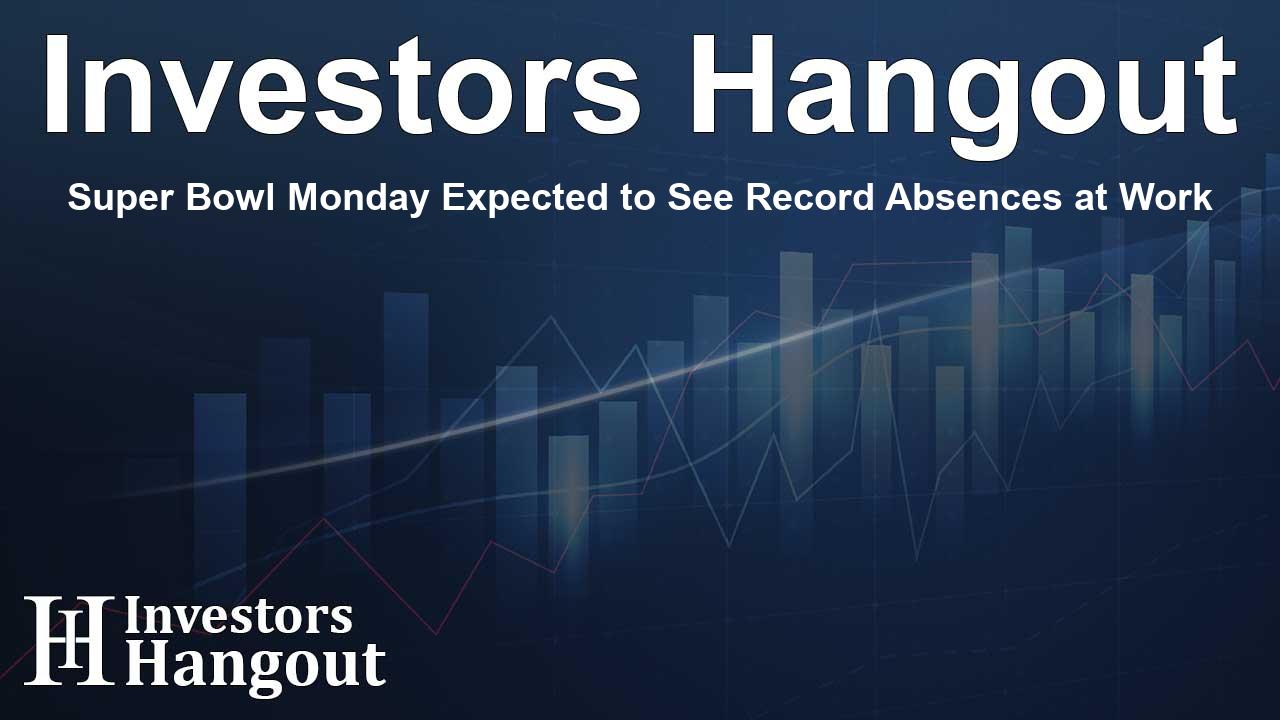Super Bowl Monday Expected to See Record Absences at Work

Super Bowl Monday: A Record Day for Employee Absences
As Super Bowl LIX approaches, many are eager not just for the game, but also for the following Monday off work. This year, an estimated 22.6 million employed Americans are planning to take the day off following the Kansas City Chiefs' bid for a historic victory, marking a significant rise in the number of employees missing work after the big game.
Survey Reveals Absence Planning is on the Rise
The survey conducted on behalf of a leading HR solutions provider highlights that this year’s anticipated employee absences are up from 16.1 million last year. This marks a substantial increase, showcasing a growing trend of employees intentionally planning their absence around popular cultural events like the Super Bowl.
Understanding the Game Plans
This year, the strategies for taking time off include various methods, such as traditional requests for leave, swapping shifts, and even calling in sick. About 3.2 million employees plan to use the “calling in sick” excuse despite not being unwell, while another 3.2 million have indicated they might simply not show up for work, also known as “ghosting.” In positive trends, around 12.9 million employees have already arranged for pre-approved time off
Dialogue and Transparency Between Managers and Employees
Amidst the rising figures of anticipated absences, the survey also sheds light on a positive shift in workplace communication. Approximately 68% of employees feel comfortable discussing their time-off requests with their managers. This improvement in dialogue suggests that workplaces are adapting to the evolving needs of their employees, making it easier for staff to balance work and personal life while ensuring that operations remain smooth.
Preparation for Increased Absenteeism
With such high levels of planned absenteeism, organizations are encouraged to prepare adequately ahead of Super Bowl Monday. Many employers recognize the potential for scheduling disruptions and are moving towards better management of workforce planning. This preparation allows teams to be covered sufficiently, mitigating disruptions to productivity.
Impact of Super Bowl on Workplace Productivity
While many employees plan to be absent, it is essential to note that those who do show up might not be at their best. The survey indicates that around 40% of those working Monday after the game expect to be distracted by the prior day's events. This distraction could lead to decreased productivity levels across various organizations, as employees reel from the excitement and activities of the big game.
Desire for a National Holiday
Interestingly, the survey also revealed that a significant 43% of employed Americans believe that the Monday after the Super Bowl should be designated a national holiday. This sentiment highlights the cultural significance of the event and its subsequent impact on daily work life. More than half of the employees who watch the Super Bowl wish they could take the day off.
Popular In-Office Days and Workforces' Adaptations
As we continue to see more employees return to in-person work arrangements, the survey found Tuesday, Wednesday, and Thursday to be the most popular in-office days. This trend showcases the changing landscape within corporate America as businesses strive to manage workforces effectively while accommodating their employees' desires for flexibility.
The Shift Toward Remote Work Flexibility
In a significant evolution of workplace dynamics, around 8 million U.S. employees are considering working remotely from home the day after the Super Bowl. This reflects a shift in the traditional workplace model as organizations increasingly adapt to remote and hybrid work solutions.
About UKG
UKG stands for Ultimate Kronos Group, which focuses on technology that drives better workplace experiences. Their mission centers around inspiring organizations to create great places to work, leveraging their expertise in HR, payroll, and workforce management.
Frequently Asked Questions
Why do so many employees plan to miss work after the Super Bowl?
Many employees use this occasion as a way to unwind after a social event, and surveys indicate an increase in planned absences for cultural observances.
What are the common reasons cited for missing work?
Employees cite reasons like calling in sick, pre-approved days off, or simply choosing not to show up, reflecting an evident goal to balance personal enjoyment and work commitments.
How are businesses reacting to this trend?
Companies are increasingly preparing for this higher absenteeism by managing work schedules more efficiently and ensuring coverage while maintaining productivity levels.
What percentage of employees think Monday after the Super Bowl should be a holiday?
A growing 43% of employees believe that the following Monday should be recognized as a national holiday, underlining the cultural impact of the Super Bowl.
Is there an increase in workplace communication regarding time off?
Yes, surveys show that employees feel more comfortable discussing absence requests with management, suggesting an improvement in workplace dialogue.
About The Author
Contact Evelyn Baker privately here. Or send an email with ATTN: Evelyn Baker as the subject to contact@investorshangout.com.
About Investors Hangout
Investors Hangout is a leading online stock forum for financial discussion and learning, offering a wide range of free tools and resources. It draws in traders of all levels, who exchange market knowledge, investigate trading tactics, and keep an eye on industry developments in real time. Featuring financial articles, stock message boards, quotes, charts, company profiles, and live news updates. Through cooperative learning and a wealth of informational resources, it helps users from novices creating their first portfolios to experts honing their techniques. Join Investors Hangout today: https://investorshangout.com/
The content of this article is based on factual, publicly available information and does not represent legal, financial, or investment advice. Investors Hangout does not offer financial advice, and the author is not a licensed financial advisor. Consult a qualified advisor before making any financial or investment decisions based on this article. This article should not be considered advice to purchase, sell, or hold any securities or other investments. If any of the material provided here is inaccurate, please contact us for corrections.
